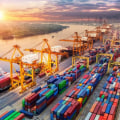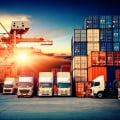As the world becomes increasingly interconnected, the demand for international trade has also grown exponentially. With this growth comes the need for efficient and reliable transportation of goods across borders. This is where international freight forwarding custom clearance plays a crucial role.
From an expert's perspective, international freight forwarding custom clearance is the process of ensuring that goods are legally and smoothly transported from one country to another. It involves a series of procedures and documentation that must be completed before goods can be shipped to their final destination.
The Importance of International Freight Forwarding Custom Clearance
International freight forwarding custom clearance is a vital aspect of global trade. Without it, the movement of goods between countries would be chaotic and unregulated. Here are some reasons why this process is essential:International freight forwarding custom clearance is a vital aspect of global trade. Without it, the movement of goods between countries would be chaotic and unregulated. Here are some reasons why this process is essential:
- Compliance with Customs Regulations: Every country has its own set of customs regulations that must be followed when importing or exporting goods. Failure to comply with these regulations can result in delays, fines, or even confiscation of goods. International freight forwarding custom clearance ensures that all necessary documents are in order and that the goods meet the requirements of the destination country.
- Smooth Movement of Goods: The process of international freight forwarding custom clearance involves coordinating with various parties, such as carriers, customs officials, and government agencies. This ensures that goods move smoothly from one point to another without any hiccups.
- Cost Savings: By working with experienced freight forwarders, businesses can save time and money on the customs clearance process. These professionals have a thorough understanding of customs regulations and can help avoid costly mistakes that could lead to delays or penalties.
The Process of International Freight Forwarding Custom Clearance
The process of international freight forwarding custom clearance can vary depending on the country, mode of transportation, and type of goods being shipped. However, there are some general steps that are typically involved:
- Documentation: The first step in the customs clearance process is to gather all the necessary documentation. This includes commercial invoices, packing lists, certificates of origin, and any other relevant documents required by the destination country.
- Preparation of Customs Declaration: Once all the documents are in order, the freight forwarder will prepare a customs declaration form. This form contains information about the goods being shipped, such as their description, value, and country of origin.
- Submission to Customs: The customs declaration form is then submitted to the relevant customs authorities for review. The customs officials will verify the information provided and may conduct physical inspections of the goods if necessary.
- Payment of Duties and Taxes: Depending on the value and type of goods being shipped, duties and taxes may be applicable. The freight forwarder will handle the payment of these fees on behalf of the importer or exporter.
- Release of Goods: Once all the necessary procedures have been completed, and any applicable fees have been paid, the goods will be released by customs and can be transported to their final destination.
The Role of Freight Forwarders in International Freight Forwarding Custom Clearance
Freight forwarders play a crucial role in international freight forwarding custom clearance. These professionals act as intermediaries between businesses and various parties involved in the transportation process. Here are some ways in which they help facilitate smooth customs clearance:
- Expertise and Knowledge: Freight forwarders have a deep understanding of customs regulations and procedures. They can help businesses navigate the complex world of international trade and ensure that all necessary requirements are met.
- Documentation and Paperwork: The customs clearance process involves a lot of paperwork, which can be overwhelming for businesses. Freight forwarders take care of all the documentation, ensuring that everything is in order and submitted on time.
- Customs Brokerage: Freight forwarders often have in-house customs brokerage services, which means they can handle all customs-related matters on behalf of their clients. This includes preparing and submitting customs declarations, paying duties and taxes, and communicating with customs officials.
- Efficiency and Speed: With their expertise and knowledge, freight forwarders can help expedite the customs clearance process. This means goods can reach their destination faster, reducing the risk of delays and disruptions to the supply chain.
In Conclusion
International freight forwarding custom clearance is a critical aspect of global trade. It ensures that goods are transported legally and efficiently between countries. By working with experienced freight forwarders, businesses can save time and money while avoiding potential pitfalls that could lead to delays or penalties. With the right partner by their side, businesses can navigate the complex world of international trade with ease.


